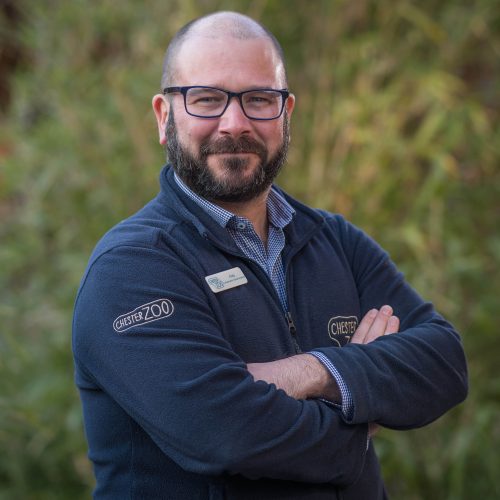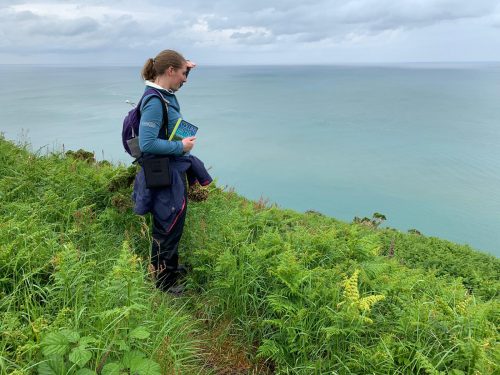Mental Health Awareness Week 2021 is here and what better way to be looking after ourselves than through connecting with the natural world around us. But how can we be sure it actually benefits our mental health? Lead Conservation Social Scientist Dr. Andy Moss, talks to us about the science behind how nature can impact our wellbeing.

“The last 12 months have obviously been strange and challenging, but it seems as though many of us have taken the opportunity to take their daily, government-approved, exercise out in nature. You probably already have an inkling that being in nature is probably good for you, but you might not know just how good…
“We often talk of wellbeing as some kind of easily-defined concept. Indeed, the Oxford dictionary defines it as “the state of being comfortable, healthy, or happy”. Straightforward, right? Well, no not really. In my job, I research the human issues that surround conservation problems. To do this, I have to come up with ways of measuring the things that people think, feel and do. So, taking the definition of wellbeing as an example, I would be trying to work out what being ‘comfortable, healthy and happy’ actually means to people. This is where it becomes tricky, as individuals will place greater emphasis on some aspects of their lives over others. To put it another way, if someone asked you ‘what is it that makes you happy?’ would you find that easy to answer?
“The good news is that simply being out in nature improves many of the things that are thought to make up human ‘wellbeing’, and there is lots of scientific evidence to support this. Much of this evidence stems from the big idea of ‘Biophilia’, which means that humans are pre-programmed by evolution to want to be in nature, as this is traditionally where we would have found all the things needed for our survival. Not only this, but for the everyday lives of our pre-civilisation ancestors, a strong connection to the natural world meant better understanding and therefore avoiding the many things that could’ve brought life to a premature end, from predators to poisonous mushrooms. But here in the modern day, research on this has shown that being in nature can reduce stress levels, boost our mood, as well as be beneficial for our social relationships. The evidence is so strong that spending time in nature can actually be medically prescribed for its wellbeing benefits, and science continues to try to understand what it might do for our physical health too.
“The even better news is that getting these benefits doesn’t need to be arduous, time-consuming or costly, and are shown to have an effect regardless of demographics such as age and gender. Anyone can benefit, and you don’t need to be running up mountains or trekking through rainforests. In fact, some of the best effects come from regular, short exposures to nature (as short as five minutes), coupled with just light to moderate exercise, such as a short stroll. In terms of where to go to get your nature fix, well this doesn’t really matter Urban green spaces, parks, forests, upland areas all have very similar benefits, although being by water has been shown to be the most effective in some cases. Even in the heart of the largest towns and cities, there’s still somewhere nearby to receive nature’s benefits.

“Ultimately, for each of us wellbeing and mental health each mean something different, and there’s no right or wrong way to find our connection with nature. While taking 5 minutes to be out in a natural setting is always a wonderful idea, wherever you are, just taking a few seconds to notice the sounds of birdsong in the air, or the feeling of the sun on your skin, can make a huge difference to your day. Even though it’s sometimes hard to feel like it, with more of us living in cities than ever before, we’re all still very much a part of this natural world, and there’s a great amount to be gained from maintaining our awareness of that fact.”
Want to connect with nature even more?
One of the best ways to get even more satisfaction from time in our natural world is to play an active role in helping it. Here in the UK at this time of year our native world is alive with the sights of all life from animals, through to plants and fungi. Much of it is native and resident, while others are migratory visitors from far away. We work hard with our friends at Record to monitor our British wildlife and ensure species are alive. When you’re taking your next 5 minutes for nature, you can help us on our mission by paying close attention to the species you see, and helping us track how our natural world is getting on. If you’re from the Cheshire, Wirral, Halton and Warrington area and are passionate about wildlife, get involved in our local project! If you’re from further afield, seek out your local wildlife recording centre to find out what projects you could get involved with.
Hedgehog Watch
Wildlife Connections
We have loads of ideas of how you can get out in nature, and help to save wildlife at the same time! Take a look at our amazing resources jam-packed with creative ideas on how you can protect wildlife whilst having fun!
NOW is the time to ACT FOR WILDLIFE. Conservation is CRITICAL; species are under threat. TOGETHER we can make a BIG difference. Take action TODAY and join us in PREVENTING EXTINCTION.
OUR TEAM OF EXPERTS WORK IN SIX REGIONS AROUND THE GLOBE – REPRESENTING SOME OF THE PLANET’S MOST BIODIVERSE HABITATS. Discover more about our SCIENCE AND CONSERVATION work.